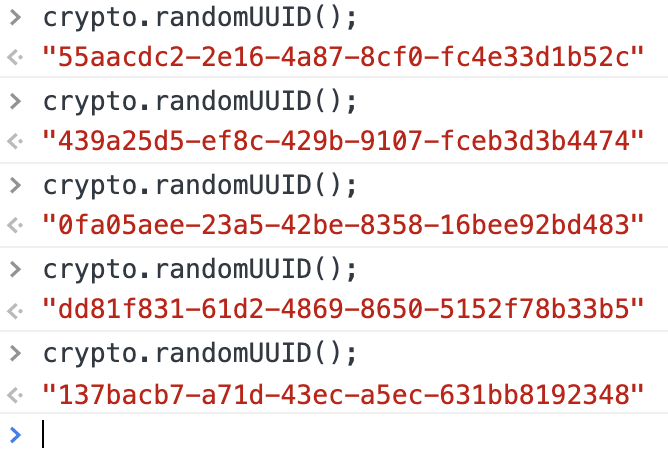Starting from Chome92 version, crypto module already supports randomUUID() method.
1. The old way
In front-end web, we usually use timestamp or Math.random() when generating a uuid. For example, on stackoverflow, there is a famous code: How to create a GUID / UUID, which is generated by Math.random().
1
2
3
4
5
6
7
8
9
|
function uuidv4() {
return 'xxxxxxxx-xxxx-4xxx-yxxx-xxxxxxxxxxxx'.replace(/[xy]/g, function (c) {
var r = (Math.random() * 16) | 0,
v = c == 'x' ? r : (r & 0x3) | 0x8;
return v.toString(16);
});
}
console.log(uuidv4()); // "f94adc58-89b7-4c70-bc92-2935ea6fb5d2" 格式一样,但每次都不一样
|
The random() method is called once for each position.
2. randomUUID
Chrome now has native support for the uuId method, crypto.randomUUID(), starting with version 92.

This randomUUID() method can be used in the future when you want to get a random value, or to identify a device (under less demanding conditions).
3. Summary
randomUUID(), a browser-provided native, does work well and conforms to the v4 version of the format.
But there is one drawback: compatibility is too poor. Not only is it not supported by other browsers, but even in Chrome, it is only available from version 92 onwards.
But I believe other browsers will support this method in the near future.
Let’s write a front-end method to get uuid.
- use crypto.randomUUID as a preference.
- if not, use preferentially use crypto.getRandomValues.
- use Math.random() for underwriting.
1
2
3
4
5
6
7
8
9
10
11
12
13
14
15
16
17
18
19
20
21
22
23
24
25
26
27
28
29
|
const generateUUID = () => {
if (typeof crypto === 'object') {
if (typeof crypto.randomUUID === 'function') {
// https://developer.mozilla.org/en-US/docs/Web/API/Crypto/randomUUID
return crypto.randomUUID();
}
if (typeof crypto.getRandomValues === 'function' && typeof Uint8Array === 'function') {
// https://stackoverflow.com/questions/105034/how-to-create-a-guid-uuid
const callback = (c) => {
const num = Number(c);
return (num ^ (crypto.getRandomValues(new Uint8Array(1))[0] & (15 >> (num / 4)))).toString(16);
};
return '10000000-1000-4000-8000-100000000000'.replace(/[018]/g, callback);
}
}
let timestamp = new Date().getTime();
let perforNow = (typeof performance !== 'undefined' && performance.now && performance.now() * 1000) || 0;
return 'xxxxxxxx-xxxx-4xxx-yxxx-xxxxxxxxxxxx'.replace(/[xy]/g, (c) => {
let random = Math.random() * 16;
if (timestamp > 0) {
random = (timestamp + random) % 16 | 0;
timestamp = Math.floor(timestamp / 16);
} else {
random = (perforNow + random) % 16 | 0;
perforNow = Math.floor(perforNow / 16);
}
return (c === 'x' ? random : (random & 0x3) | 0x8).toString(16);
});
};
|
